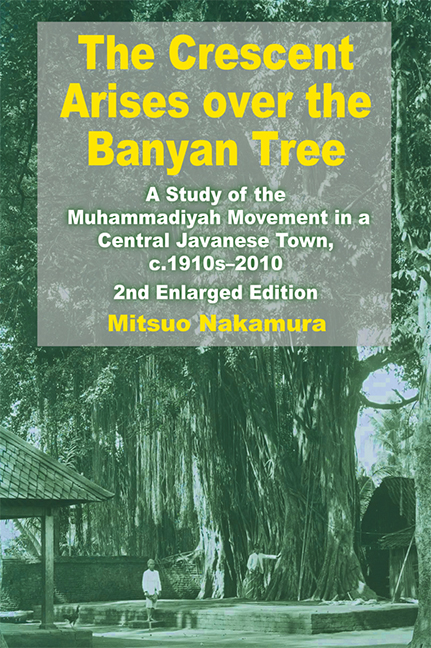 The Crescent Arises over the Banyan Tree
The Crescent Arises over the Banyan Tree from PART I - DEVELOPMENT OF THE MUHAMMADIYAH IN KOTAGEDE, c.1910s–1972
Published online by Cambridge University Press: 21 October 2015
So, to get along well with your neighbour, the way must be proper. When the neighbour just drops in to chat with you (omong-omongan), just welcome him and chat. If he doesn't pray yet, that's all right. You should not make a fool of him (aja ngolok-olok). You should not tease him irritatingly (aja ngece-ece). If he falls sick, then just go and see (tuwéni); if in need, go and help; if down with a cold, go and give a coin-massage (keroki). Well, it is up to you how you actually do your help. But that is what is called sasrawungan ingkang saé (harmonious way of social intercourse). ‘Aisyiyah people, Muhammadiyah people, must be able to do this. (Speech by Bapak A.R. Fakhruddin, President of Muhammadiyah, 28 November 1971, Kotagede).
RELIGIOUS COMMUNICATIONS AMONG JAVANESE MUSLIMS
In the preceding chapters I have attempted to make two major points. The first, a historical point, has been that the Muhammadiyah movement must be regarded as a development from within Javanese society rather than as a ready-made import from without. The second, a more contemporary and sociological point, has been that the social basis of the Muhammadiyah movement has become greatly widened and it is no longer confined to a small segment of society like the urban bourgeoisie. In this chapter I shall examine critically another aspect of the conventional view that reformist Islam, including the Muhammadiyah, is fundamentally alien to Javanese or non-Javanese, in cultural terms (e.g., Benda 1965, p. 133; Geertz 1968, p. 16). I shall argue that reformist Islam is not antithetical to Javanese culture but an integral part of it, and what reformists have been endeavouring is, so to speak, to distil a pure essence of Islam from Javanese cultural traditions. The final product of distillation does retain a Javanese flavour, just as any highly pure liquors cannot lose their local flavours. But the universalistic essence of Islam is more fundamental, and it should be appreciated as it is first and foremost.
To save this book to your Kindle, first ensure [email protected] is added to your Approved Personal Document E-mail List under your Personal Document Settings on the Manage Your Content and Devices page of your Amazon account. Then enter the ‘name’ part of your Kindle email address below. Find out more about saving to your Kindle.
Note you can select to save to either the @free.kindle.com or @kindle.com variations. ‘@free.kindle.com’ emails are free but can only be saved to your device when it is connected to wi-fi. ‘@kindle.com’ emails can be delivered even when you are not connected to wi-fi, but note that service fees apply.
Find out more about the Kindle Personal Document Service.
To save content items to your account, please confirm that you agree to abide by our usage policies. If this is the first time you use this feature, you will be asked to authorise Cambridge Core to connect with your account. Find out more about saving content to Dropbox.
To save content items to your account, please confirm that you agree to abide by our usage policies. If this is the first time you use this feature, you will be asked to authorise Cambridge Core to connect with your account. Find out more about saving content to Google Drive.